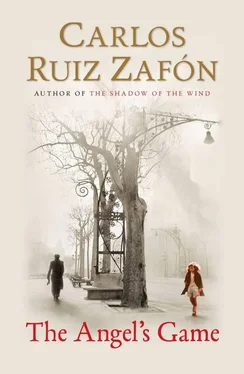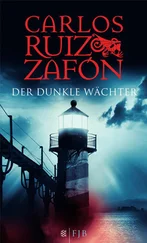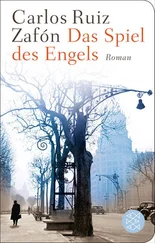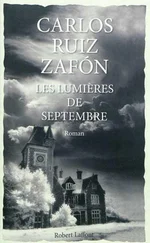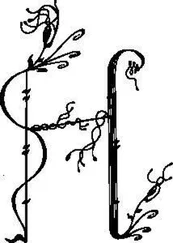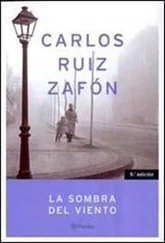‘The symphony orchestra performing in your own home,’ said the auditor. ‘What more could one ask for? You’ll live like a lord here.’
The manager shot him a murderous look, clearly in disagreement. We went through the apartment until we reached the gallery at the back, where a coffee service lay on a table and an open book on an armchair was still waiting for someone to turn over the page.
‘It looks like whoever lived here left suddenly, with no time to take anything with them,’ I said.
The auditor cleared his throat.
‘Perhaps the gentleman would like to see the study?’
The study was at the top of a tall tower, a peculiar structure at the heart of which was a spiral staircase that led off the main corridor, while its outside walls bore the traces of as many generations as the city could remember. There it stood, like a watchtower suspended over the roofs of the Ribera quarter, crowned by a narrow dome of metal and tinted glass that served as a lantern, and topped by a weathervane in the shape of a dragon. We climbed the stairs, and when we reached the room at the top, the auditor quickly opened the windows to let in air and light. It was a rectangular room with high ceilings and dark wooden flooring. Its four large arched windows looked out on all four sides, giving me a view of the cathedral of Santa María del Mar to the south, the large Borne market to the north, the railway station to the east and to the west the endless maze of streets and avenues tumbling over one another towards Mount Tibidabo.
‘What do you say? Marvellous!’ proposed the auditor enthusiastically.
The property manager examined everything with a certain reserve and displeasure. His secretary held the lamp up high, even though it was no longer needed. I went over to one of the windows and leaned out, spellbound.
The whole of Barcelona stretched out at my feet and I wanted to believe that when I opened those windows – my new windows – each evening its streets would whisper stories to me, secrets in my ear, that I could catch on paper and narrate to whoever cared to listen. Vidal had his exuberant and stately ivory tower in the most elegant and elevated part of Pedralbes, surrounded by hills, trees and fairytale skies. I would have my sinister tower rising above the oldest, darkest streets of the city, surrounded by the miasmas and shadows of that necropolis which poets and murderers had once called the Rose of Fire.
What finally decided the matter was the desk that dominated the centre of the study. On it, like a great sculpture of metal and light, stood an impressive Underwood typewriter for which, alone, I would have paid the price of the rent. I sat in the plush armchair facing the desk, stroked the typewriter keys, and smiled.
‘I’ll take it,’ I said.
The auditor sighed with relief and the manager rolled his eyes and crossed himself. That same afternoon I signed a ten-year rental agreement. While workmen were busy wiring the house for electricity, I devoted my time to cleaning, tidying and straightening the place up with the help of three servants whom Vidal sent trouping down without first asking me whether or not I wanted any help. I soon discovered that the modus operandi of that commando of electrical experts consisted in first drilling holes right, left and centre and then asking. Three days after their deployment, the house did not have a single light bulb that worked, but one would have thought that the place had been infested by a plague of woodworm that devoured plaster and the noblest of minerals.
‘Are you sure there isn’t a better way of fixing this?’ I would ask the head of the battalion, who resolved everything with blows of the hammer.
Otilio, as the talented man was called, would show me the building plans supplied by the property manager when I was handed the keys, and argue that the problem lay with the house, which was badly built.
‘Look at this,’ he would say. ‘I mean, when something is badly made, it’s badly made, and there are no two ways about it. Here, for example. Here it says that you have a water tank on the terrace. Well, no, sir, you have a water tank in the back yard.’
‘What does it matter? The water tank has nothing to do with you, Otilio. Concentrate on the electrics. Light. Not taps, not water pipes. Light. I need light.’
‘But everything is connected. What do you think about the gallery?’
‘I think it has no light.’
‘According to the plans this should be a supporting wall. Well, my mate Remigio here tapped it ever so slightly and half the wall came crashing down. And you should see the bedrooms. According to this plan, the size of the room at the end of the corridor should be almost forty square metres. Not in a million years! I’d be surprised if it measured twenty. There’s a wall where there shouldn’t be a wall. And as for the waste pipes, well, best not talk about them. Not one of them is where it’s supposed to be.’
‘Are you sure you know how to read the plans?’
‘Listen, I’m a professional. Mark my words: this house is a jigsaw puzzle. Everybody’s grandmother has poked their nose into this place.’
‘I’m afraid you’re going to have to make do with what there is. Perform a few miracles or do whatever you want, but by Friday I want to see all the walls plastered and painted, and the lights working.’
‘Don’t rush me; this is precision work. One has to act strategically. ’
‘So what is your plan?’
‘For a start we’re off to have our breakfast.’
‘You only got here half an hour ago!’
‘Señor Martín, we’re not going to get anywhere with that attitude.’
The ordeal of building work and botched jobs went on a week longer than expected, but even with the presence of Otilio and his squadron of geniuses making holes where they shouldn’t and enjoying two-and-a-half-hour breakfasts, the thrill of being able to live in that old rambling house, which I had dreamed about for so long, would have kept me going for years with candles and oil lamps if need be. I was lucky in that the Ribera quarter was a spiritual home for all kinds of craftsmen: just a stone’s throw from my new home I found someone who could put in new locks that didn’t look as if they’d been stolen from La Bastille, as well as twentieth-century wall lights and taps. The idea of having a telephone line installed did not appeal to me and, judging by what I’d heard on Vidal’s wireless, these ‘new mass communication media’, as the press called them, were not aimed at people such as myself. I decided that my existence would be one of books and silence. All I took from the pensión was a change of clothes and the case containing my father’s gun, his only memento. I distributed the remainder of my clothes and personal belongings among the pensión residents. Had I also been able to leave behind my memories, even my skin, I would have done so.
The same day as the first instalment of City of the Damned was published, I spent my first official and electrified night in the tower house. The novel was an imaginary intrigue I had woven round the story of the fire in El Ensueño in 1903, about a ghostly creature who had bewitched the streets of the Raval quarter ever since. Before the ink had dried on that first edition I had already started work on the second novel of the series. By my reckoning, based on thirty uninterrupted days’ work a month, Ignatius B. Samson had to produce an average of 6.66 pages a day to comply with the terms of the agreement, which was crazy but had the advantage of not giving me much time to think about it.
I hardly noticed that, as the days went by, I was beginning to consume more coffee and cigarettes than oxygen. As I gradually poisoned my brain, I had the feeling that it was turning into a steam engine that never cooled down. But Ignatius B. Samson was young and resilient. He worked all night and collapsed from exhaustion at dawn, possessed by strange dreams in which the letters on the page trapped in the typewriter would come unstuck and, like spiders made of ink, would crawl up his hands and face, working their way through his skin and nesting in his veins until his heart was covered in black and his pupils were clouded in pools of darkness. I would barely leave the old rambling house for weeks on end, and would forget what day of the week it was, or what month of the year. I paid no attention to the recurring headaches that would sometimes plague me, arriving all of a sudden as if a metal awl were boring a hole through my skull, burning my eyes with a flash of white light. I had grown accustomed to living with a constant ringing in my ears that only the murmur of wind or rain could mask. Sometimes, when a cold sweat covered my face and I felt my hands shaking on the Underwood keyboard, I told myself that the following day I would go to the doctor. But on that day there was always another scene, and another story to tell.
Читать дальше
